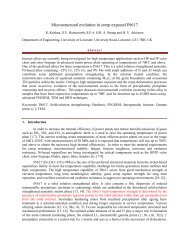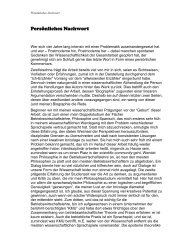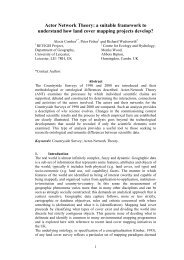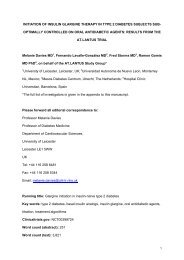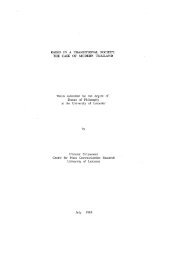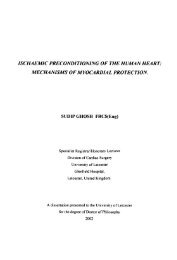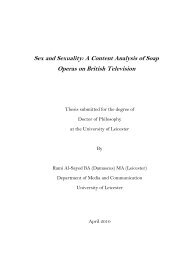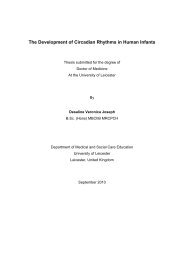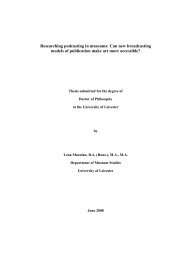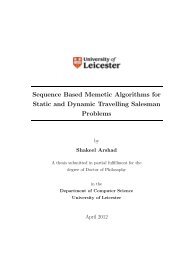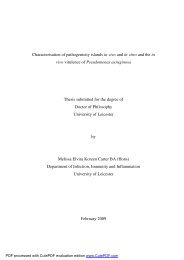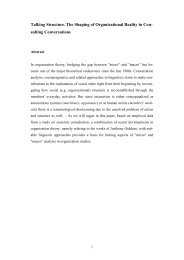Synthesis and Comparison of the Reactivity of Allyl Fluorides and ...
Synthesis and Comparison of the Reactivity of Allyl Fluorides and ...
Synthesis and Comparison of the Reactivity of Allyl Fluorides and ...
Create successful ePaper yourself
Turn your PDF publications into a flip-book with our unique Google optimized e-Paper software.
6.5.7 Preparation <strong>of</strong> 2,2-difluoro-1-phenylbut-3-enyl 4-methylbenzoate (164)<br />
188<br />
Chapter Six<br />
The title compound was prepared using a method<br />
outlined by Nakamura et al. [7] A 100 cm 3 , two-necked<br />
round-bottomed flask was equipped with a magnetic<br />
stirring bar, <strong>and</strong> Rotaflo tap <strong>and</strong> attached to a Schlenk<br />
line. After flame-drying under high vacuum, <strong>the</strong> flask<br />
was cooled <strong>and</strong> filled with nitrogen. The reaction flask<br />
was charged with 2,2-difluoro-1-phenylbut-3-en-1-ol<br />
(0.05 g, 0.27 mmol) <strong>and</strong> pyridine (1 cm 3 ) <strong>and</strong> cooled to 0 ºC. 4-methylbenzoyl chloride<br />
(0.03 cm 3 , 0.26 mmol) was added <strong>and</strong> <strong>the</strong> reaction mixture warmed to room temperature <strong>and</strong><br />
stirred for 4 h. After which <strong>the</strong> reaction was quenched with brine (5 cm 3 ) <strong>and</strong> diethyl e<strong>the</strong>r<br />
(5 cm 3 ). The organic layer was <strong>the</strong>n separated <strong>and</strong> washed with HCl (1 cm 3 , 5 % aqueous<br />
solution), saturated brine (10 cm 3 ), saturated NaHCO3 (10 cm 3 ) <strong>and</strong> saturated brine (10 cm 3 )<br />
successively, <strong>the</strong>n dried over magnesium sulphate. After removal <strong>of</strong> solvent in vacuo <strong>the</strong><br />
crude product was purified by column chromatography [chlor<strong>of</strong>orm: hexane (30:70)],<br />
affording <strong>the</strong> product as an oil (16 mg, 20 %). δH 5.44 (1H, d, 3 JHH = 11.0 Hz, Hb), 5.62<br />
(1H, ddt, 3 JHH = 17.2 Hz, 4 JHF = 2.7 Hz, 2 JHH = 0.8 Hz, Ha), 5.86 (1H, ddt, 3 JHH = 17.2 Hz,<br />
3 JHF = 11.4Hz, 3 JHH = 11.0 Hz, Hc), 6.13 (1H, ap.t, 3 JHF = 9.8 Hz, CHO), 7.20 (2H, d, 3 JHH =<br />
8.2 Hz, ArH-3), 7.27-7.32 (3H, m, ArH’), 7.40-7.45 (2H, m, ArH’), 7.93 (2H, dm, 3 JHH = 8.2<br />
Hz, ArH-2); δC 21.7 (CH3), 75.6 (t, 3 JCF = 30.2 Hz, CHCF2), 118.2 (t, 1 JCF = 244.0 Hz, CF2),<br />
121.9 (t, 3 JCF = 8.8 Hz, CHCH2), 126.7 (ArC-1), 128.2 (ArCH-3’), 128.3 (ArCH-2’), 129.1<br />
(ArCH-4’), 129.3 (ArCH-3), 129.9 (t, 2 JCF = 26.1 Hz, CHCH2), 130.0 (ArCH-2), 133.5<br />
(ArC-1), 144.4 (ArC-4’), 164.8 (C=O); δF -106.0 (d, 2 JFF = 249.1 Hz, CF), -109.2 (1F, d, 2 JFF<br />
= 249.1 Hz, CF). m/z (EI + ) 302 ([M] + , 5 %) 119 ([M-OCH(C6H5)CF2CH=CH2] + , 100 %).<br />
HRMS (EI) 302.11153 (C18H16O2F2 requires 302.11144).<br />
6.5.8 Preparation <strong>of</strong> (1-(benzyloxy)-2,2-difluorobut-3-enyl)benzene (165)<br />
The title compound was prepared using a method outlined by<br />
Wu et al. [22] A 100 cm 3 , two-necked round-bottomed flask<br />
was equipped with a magnetic stirring bar, dropping funnel<br />
<strong>and</strong> Rotaflo tap <strong>and</strong> attached to a Schlenk line. After flame-<br />
drying under high vacuum, <strong>the</strong> flask was cooled <strong>and</strong> filled<br />
with nitrogen. The flask was charged with a suspension <strong>of</strong><br />
NaH in anhydrous DMF via syringe, <strong>and</strong> stirred at 0 ºC. 2,2-difluoro-1-phenylbut-3-en-1-ol



